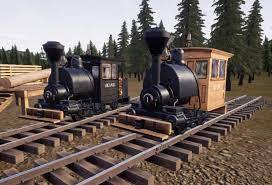10 Ways Railroads Have Changed The World

Railroads have had a profound impact on the world, enabling people to travel long distances and connecting far-flung places in ways never before imagined. This article will explore 10 amazing ways railroads have changed our world, from transportation to industry to even technology. Learn how this revolutionary mode of transport has transformed the way we live, work, and interact with each other!
How railroads have changed the world
In the early 1800s, people in the United States began to build railroads. At first, they used them to move goods from one place to another. But soon, people realized that railroads could also be used to move people. This was a big change!
Now, instead of taking weeks or months to travel by horse or wagon, people could travel by train in just a few days. This made it possible for people to visit family and friends who lived far away. It also made it possible for businesses to ship goods quickly and efficiently.
Over time, railroads have continued to play an important role in our world. They’ve helped connect different parts of the country, and they’ve played a vital role in shipping goods and materials around the globe. Today, there are more than 1 million miles of railways criss-crossing the planet!
Railroads have had a profound impact on the world, from facilitating trade and transport to providing jobs and opening up new markets for goods.
Railroads played a major role in developing countries in particular, helping to stimulate economic growth and expand access to education, health care, and other vital services. They also helped to reduce poverty and inequality by bringing new opportunities to rural areas.
In recent years, railroads have been facing increasing competition from other forms of transportation such as planes and automobiles. However, railways continue to play an important role in connecting people and economies around the world.
Railroads have changed the world in so many ways. They have allowed for faster travel, increased trade and commerce, and they have helped shape the landscape of our planet. Railroads have also played a significant role in both wars and global politics. Here are just some of the ways railroads have changed the world:
1. Railroads Have Faster Traveled
Railroads allowed for much faster travel than ever before. Before railroads were developed, travelers had to rely on horse-drawn carriages or boats to get from one place to another. With railroads, people could now travel at speeds of up to 40 mph which made it much easier to get from one place to another. This was especially important during times of war when soldiers needed to be able to move quickly from one battlefield to another.
2. Railroads Increased Trade And Commerce
Railroads opened up new markets for goods and products and improved trade between countries around the world. This was especially important during times of war when countries needed to export goods in order to help support their troops fighting on the battlefields. Railroads also made it easier for people to commute into cities which led to increased demand for housing and other urban amenities.
3. Railroads Shaped The Landscape Of Our Planet
Railways have played a major role in shaping the landscape of our planet. For example, railways were responsible for pushing trees out of certain areas so that they could be used as land for railroad
Impact on the Industrial Revolution
The first railroad was built in England in 1825, and within a few decades, railroads were crisscrossing Europe and North America. These early railroads had a profound impact on the industrial revolution and the way goods were transported. Here are some ways railroads have changed the world:
1. Railroads made it possible to move large quantities of goods long distances quickly and cheaply. This meant that factories could be located far from raw materials and markets, which led to the growth of industry and cities.
2. Railroads spurred the development of new technologies, such as steel rails, locomotives, and signaling systems.
3. Railroads created a new class of workers – engineers, conductors, brakemen, etc. – and provided jobs for many immigrants who came to North America in search of work.
4. The rise of the railroad also led to the development of new industries, such as tourism and leisure travel.
Railroads have had a profound impact on the world, not just in terms of transportation but also in terms of economic development. They played a significant role in the Industrial Revolution, which led to unprecedented growth and prosperity. Sam Downloads
Railroads allowed for the transportation of goods and materials across vast distances, which in turn helped to spur industrialization. They also made it possible for businesses to expand rapidly and reach new markets. Railroads also played a major role in developing economies, as they allowed for the export of goods and services.
Railroads have continued to play an important role in modern day society. They are used for transportation both within and outside of countries, and their impact on global commerce is undeniable.
Impact on America’s westward expansion
In the early 1800s, America’s westward expansion was largely facilitated by the development of railroads. The first major railroad in the United States was the Baltimore and Ohio Railroad, which opened in 1830. This railroad allowed for much faster and more efficient transportation of goods and people between the east coast and the interior of the country.
The development of railroads had a number of other impacts on America’s westward expansion. First, it made it possible for settlers to travel to the western frontier much more easily. Second, it facilitated the transportation of supplies and resources to these same settlers. Finally, it helped to connect different parts of the country, making trade and communication between regions much easier.
All of these factors combined helped to spur on America’s westward expansion in the 19th century. The railroads played a vital role in this process, and their impact cannot be overstated.
Railroads have had a profound impact on America’s westward expansion. They have facilitated the transportation of people and goods over long distances, opening up new areas for settlement and development. Railroads also played a significant role in the military campaigns of the 19th century, allowing for the rapid deployment of troops and supplies to remote areas.
Impacts on foreign policy and different wars
The first way that railroads have changed the world is by impacting foreign policy and different wars. One example of this is how railways were used in the American Civil War. The Union had a much better system of railways, which helped them to transport troops and supplies more efficiently. This ultimately led to the Union’s victory in the war.
Another example is how railways have been used in more recent conflicts, such as the First and Second World Wars. Railways were essential in transporting troops and supplies to the front lines. In fact, many battles were fought over control of key railway lines.
So, it’s clear that railroads have had a significant impact on both foreign policy and war. They’ve helped to transport armies and supplies, which has often been crucial in determining the outcome of conflicts.
1.1 Introduction
In the early days of railroads, they were built to move people and freight between cities that were already well-connected by waterways. But as railroads began to span continents, they became an essential part of a nation’s infrastructure, capable of moving large armies and supplies quickly over long distances. This had a profound impact on the conduct of wars and the development of foreign policy.
1.2 The American Civil War
The American Civil War was the first major conflict in which railroads played a significant role. Prior to the war, the United States had a patchwork system of railroads that were mostly used for local transportation. But as the war escalated, both sides realized that controlling the railways would be crucial to victory.
The Union blockade of Confederate ports cut off most maritime trade, so the Confederacy turned to its railroads to move supplies and troops around the country. The Union also made use of its superior railway network to transport troops and supplies to battlefields across the country. In many cases, battles were fought over control of key railway lines.
The use of railroads during the Civil War had a lasting impact on military strategy and tactics. It also showed how important railways had become to national economies and strategic planning.
1.3 World War I
World War I was another conflict in which railways played a vital role. The massive mobilization of troops and supplies would not have been possible without them. Railways were
Economics and impacts on culture
The first section of the blog article examines how railroads have changed the world from an economic perspective. It discusses how the railroad industry has helped to drive economic growth and development, as well as how it has shaped cultural change.
The railroad industry has long been an important driver of economic growth and development. In the early days of railroads, they were primarily used for transporting goods and materials between different parts of the country. This helped to spur on industrialization and commerce, as businesses could now easily move goods to marketplaces.
As time went on, railroads began to play a more significant role in passenger travel. This was initially seen as a luxury, but eventually became more commonplace. Railroads made it possible for people to travel great distances in relatively short periods of time, which helped to promote trade and cultural exchange. Today, railroads continue to be an important part of the economy, transporting both passengers and freight around the world.
In addition to their economic impact, railroads have also had a significant impact on culture. They have played a role in shaping how people live and work, as well as how they interact with each other. For example, the introduction of passenger trains allowed people from different parts of the country to meet and interact with each other in new ways. This led to a more mobile population and increased cultural exchange. Additionally, railroads have been responsible for introducing new technologies and ideas into society.





One Comment